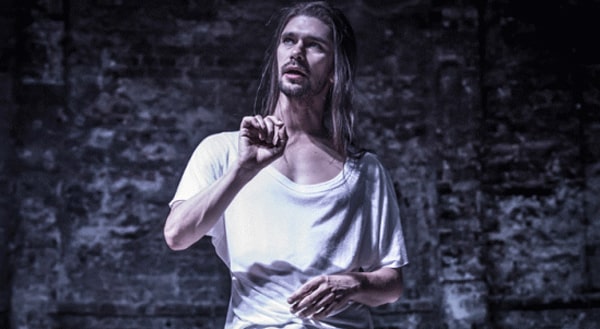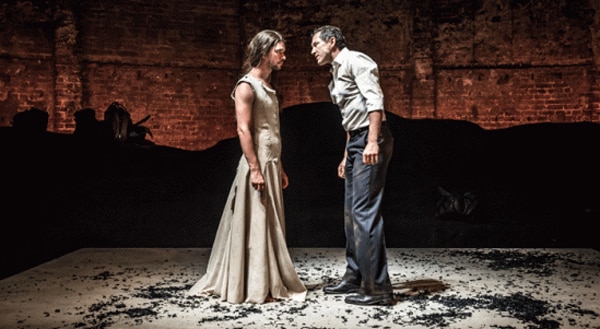Bakkhai
Almeida Theatre
31 July 2015
5 Stars
He comes in five guises.
The first is almost pixie-like. Blue skinny trousers, a white Tshirt, both worn loosely, tousled. Long, very long, black hair and equally long limbs. The smile is seductive, the mood mischievous, the purpose – exposition. The stance, angular; flesh displayed, provocatively, tantalisingly. Eyes alive, darting. He could be a Rock legend or a movie star. This is the God, Dionysius, come to make the non-believers believe, and enjoy himself along the way.
The second is a wise old man, Teiresias, friend of Kadmos, whose grandson, Pentheus, now rules in Thebes. With Ivy wrapped in his hair, a frame stooped by age and wear, and a voice that uncannily summons up images of John Hurt, Teiresias seeks to worship Dionysius. He has seen the writing on the wall, even though his eyes are dead. But Pentheus stops him and Teiresias fears for Pentheus’ future.
The third is part Christ-figure, part Siren, part tempter/temptress, part cajoler, and all bewitching God. His very slim frame is covered in a long dress made of animal skin; it seems soft, carnal, hedonistic and sacrificial all at once. Beguiling and abhorrent. This is Dionysius persuading Pentheus to take a different tack – to don a woman’s guise and to go among the women of Thebes who have fled the city and are wildly celebrating and worshipping Dionysius on the mountain of Kithairon. He is immensely persuasive, can counter any argument, make any proposition seem natural and obvious. The personification of irresistible allure.
The fourth is a frantic servant, an ordinary person caught up in extraordinary things. He has seen something horrific and must recount it. The pain, fear and desolate rage he feels is sewn into every word he punches out. He has looked at a God’s vengeance in all its grim, fantastic awfulness. He will never be the same.
The fifth is Dionysius in one of his God visages : the head of a bull, a firm, muscular torso covered in black muck of some kind (excrement, dirt, the waters of the River Styx?) and a raging, petulant, shrieking voice. This one is genuinely scary, unsettling to the core. And yet, clearly there all along…
This is Ben Whishaw, electrifying, raw, intense and extraordinary in James Macdonald’s production of Euripides’ Bakkhai, part of the Almeida Greeks season. Better by some distance than The Orestia which preceded it in the season, and benefitting from a lucid, modern text courtesy of Anne Carson, this production rips along and easily holds attention for its near two hour uninterrupted duration.
The play was first performed after Euripides’ death and earned him posthumous awards. It is often considered the final chapter in the development of Greek Tragedy, as well as being the piece which reinvigorated the genre. This notion of duality and transformation is everywhere in the writing.
It is a play which can bear any number of interpretations. Macdonald does not choose a particular path; rather, he tells the tale with assiduous clarity and let’s it speak to each audience member on their own terms. You can take from this production what you bring to it – the cast will simply light a candle, what you see is up to you.
If you have never seen Greek Tragedy, this is an excellent starting point. If you have been burnt by tedious productions of Greek Tragedy, let this one work its magic on you. It is terrific.
Sticking to the traditions of Euripides’ time, MacDonald uses a ten strong Chorus (here women, rather than the traditional boys) and three actors. The Chorus have a particular role, watching, commenting, participating; the three actors play all the other roles. This allows the actors great scope for wonderful performances, as well as permitting an exploration of the ambiguities, uncertainties, and double-edged nature of events.
Anthony McDonald’s design is splendid. The bare unwashed brick walls of the Almeida, a plain platform, dark, volcanic rocks strewn between wall and platform and around the sides. Untrammelled and unadorned nature. High in the air, a set of bright lights, almost as if an operating theatre (or perhaps a rock arena) was there – the sharp illumination emphasising the scalpel-like precision of Dionysius’ manoeuvring and the realities laid bare in the space.
Orlando Gough provides richly detailed, but profoundly difficult, a capella music for the very female Chorus. There are some intriguing and complex harmonics, but, for the most part, the music is not melodic, its dissonance and harshness to the fore. The women perform the music with exemplary skill, but often one wondered if more raunchy, obviously earthy and sexual tunes might not have been more appropriate. Somehow, the presence of the Chorus is dominated by the music, and not always are Carson’s words served well by the vocal lines. A palpable sense of sweaty, intoxicating cavorting in the music might have served the purpose better.
And, in a way, that is the complaint here. Whishaw aside, it all seems a little too safe. The passions and hatred and fear are not as pronounced as they might be.
In the most part, this is down to Bertie Carvel. While his Pentheus is suitably laced up, icily resolved to oppose Dionysius and a petty bureaucrat, the undercurrents are not permitted to break the surface often enough or excessively enough. True, he is quick to ask what sort of dress he should wear, and he happens to have a very nice Chanel suit in the cupboard, but there is no tangible sense of his attraction to Whishaw’s tempting, no inkling of the maggots writhing beneath the skin, desperate to break out. The conflict within Pentheus is left unspoken mostly, subtlety done, when in-your-face may have been more confronting and rewarding.
Equally, the ghost of Miss Trunchball hovers around the scene where Pentheus-in-drag appears, especially in the moment when Whishaw helps him fix a loose strand of grey wig which has come asunder because he was practising flicking his tresses, but also when the hungry look comes in his eyes as he sees his painted lips in the mirror and snatches the lipstick from Whishaw’s hands to apply extra colour. This is more about the costume choices than Carvel’s work, but it is a pity.
Carvel’s best work comes when he plays Agave, Pentheus’ mother. She has abandoned Thebes for the feral, exultant life on the mountain and she does not know what she is doing when she and her sisters slaughter and tear apart (literally) her own son. When her father finally makes her see the truth, Agave collapses into her grief and Carvel plays the wildly fluctuating moods of Agave with dexterity and true commitment. Wearing only a shift, and covered in the same mysterious, but obviously foul, dark splatter as Whishaw’s bullhead God, Carvel makes Agave both her father’s daughter and her son’s mother. There is a profound sadness about Agave’s fate.
Kevin Harvey, the third actor in the trio, is superb. His stiff and fragile Kadmos is beautifully, carefully portrayed, an aching portrait of pain and regret. He is excellent playing off Whishaw’s Teiresias and Carvel’s Agave – he brings the best out of both. His use of his voice is exceptional, long phrases of real beauty pepper his delivery. He is also quite magnificent as a shocked Herdsman who tries to convince Pentheus of the need to embrace Dionysius and beware the woman on the mountain.
But it is Whishaw’s show – no question.
He is a force of nature, fiercely unearthing every moment of nuance, humour and purpose from the text and giving a totally committed, undeniably powerful and persuasive performance. Every moment is fascinating, thought through and skilfully played.
Dionysius was the God of the theatre, as well as wine, song and dance. Whishaw makes this part of the very fabric of his turn as the vengeful God, and offsets that performance with two remarkable cameos – as Tieresias and the Messenger. He is magical in every way. He channels the ecstasy of Dionysius equally with his capricious rage. There are cute moments of comic delight, vicious splutterings of the explosive kind, and softly beguiling entreaties under which poison lurks. An enigmatic and profoundly complex performance, Whishaw is like a Greek Rubik’s Cube: colourful, tempting, almost impossible.
Carson describes Dionysius this way:
“He is a young God. Mythologically obscure, always just arriving at some new place to disrupt the status quo, wearing the start of a smile.”
Once you see Whishaw’s turn here, you will never forget his start of a smile. Or stop fearing what it means.



